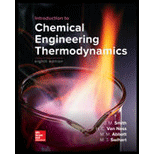
Interpretation:
The enthalpy and entropy of a liquid-vapor equilibrium mixture at a temperature of
Concept Introduction:
- For a two-phase liquid-vapor equilibrium mixture the specific volume (V), enthalpy (H) and entropy (S) are given as:
Enthalpy, H =
Entropy, S =
Given:
Total mass, M = 3.0 lbm
Equilibrium temperature =
Explanation:
Based on the steam tables at temperature =
Specific volume of liquid, vf = 0.01799 ft3/lbm
Specific volume of vapor, vg = 3.3426 ft3/lbm
Specific enthalpy of liquid, Hf = 321.73 Btu/lbm
Specific enthalpy of vapor, Hg = 1192.7 Btu/lbm
Specific entropy of liquid, Sf = 0.50322 Btu/lbm-R
Specific entropy of liquid, Sg = 5.7450 Btu/lbm-R
Calculation:
Step 1:
Calculate the steam quality x using equation (3)
It is given that in the volumes of the vapor is 50 times the volume of liquid. The total volume, Vt is:-
Step 2:
Calculate H and S based on equations 1 and 2
Thus the total enthalpy and entropy values are:
Enthalpy, H =
Entropy, S =
Want to see the full answer?
Check out a sample textbook solution
Chapter 6 Solutions
Introduction to Chemical Engineering Thermodynamics
 Introduction to Chemical Engineering Thermodynami...Chemical EngineeringISBN:9781259696527Author:J.M. Smith Termodinamica en ingenieria quimica, Hendrick C Van Ness, Michael Abbott, Mark SwihartPublisher:McGraw-Hill Education
Introduction to Chemical Engineering Thermodynami...Chemical EngineeringISBN:9781259696527Author:J.M. Smith Termodinamica en ingenieria quimica, Hendrick C Van Ness, Michael Abbott, Mark SwihartPublisher:McGraw-Hill Education Elementary Principles of Chemical Processes, Bind...Chemical EngineeringISBN:9781118431221Author:Richard M. Felder, Ronald W. Rousseau, Lisa G. BullardPublisher:WILEY
Elementary Principles of Chemical Processes, Bind...Chemical EngineeringISBN:9781118431221Author:Richard M. Felder, Ronald W. Rousseau, Lisa G. BullardPublisher:WILEY Elements of Chemical Reaction Engineering (5th Ed...Chemical EngineeringISBN:9780133887518Author:H. Scott FoglerPublisher:Prentice Hall
Elements of Chemical Reaction Engineering (5th Ed...Chemical EngineeringISBN:9780133887518Author:H. Scott FoglerPublisher:Prentice Hall
 Industrial Plastics: Theory and ApplicationsChemical EngineeringISBN:9781285061238Author:Lokensgard, ErikPublisher:Delmar Cengage Learning
Industrial Plastics: Theory and ApplicationsChemical EngineeringISBN:9781285061238Author:Lokensgard, ErikPublisher:Delmar Cengage Learning Unit Operations of Chemical EngineeringChemical EngineeringISBN:9780072848236Author:Warren McCabe, Julian C. Smith, Peter HarriottPublisher:McGraw-Hill Companies, The
Unit Operations of Chemical EngineeringChemical EngineeringISBN:9780072848236Author:Warren McCabe, Julian C. Smith, Peter HarriottPublisher:McGraw-Hill Companies, The





